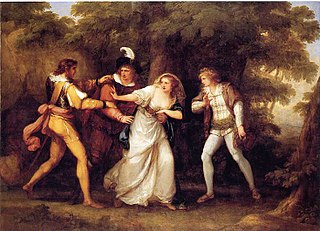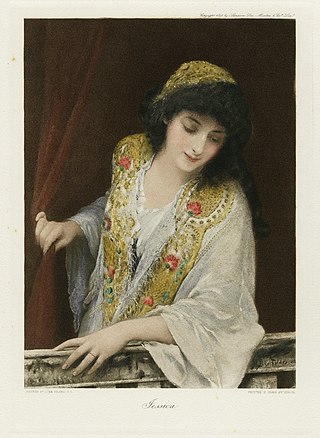Related Research Articles

Isabella d'Este was Marchioness of Mantua and one of the leading women of the Italian Renaissance as a major cultural and political figure.

Ludovico Maria Sforza, also known as Ludovico il Moro and termed the "arbiter of Italy" by historian Francesco Guicciardini, was an Italian Renaissance nobleman who ruled as Duke of Milan from 1494 to 1499.

The Two Gentlemen of Verona is a comedy by William Shakespeare, believed to have been written between 1589 and 1593. It is considered by some to be Shakespeare's first play, and is often seen as showing his first tentative steps in laying out some of the themes and motifs with which he would later deal in more detail; for example, it is the first of his plays in which a heroine dresses as a boy. The play deals with the themes of friendship and infidelity, the conflict between friendship and love, and the foolish behaviour of people in love. The highlight of the play is considered by some to be Launce, the clownish servant of Proteus, and his dog Crab, to whom "the most scene-stealing non-speaking role in the canon" has been attributed.
The Witch is a Jacobean play, a tragicomedy written by Thomas Middleton. The play was acted by the King's Men at the Blackfriars Theatre. It is thought to have been written between 1613 and 1616; it was not printed in its own era, and existed only in manuscript until it was published by Isaac Reed in 1778.
Robert Davenport was an English dramatist of the early seventeenth century. Nothing is known of his early life or education; the title pages of two of his plays identify him as a "Gentleman," though there is no record of him at either of the two universities or the Inns of Court. Scholars have guessed that he was born c. 1590; if, as some scholars think, he wrote the Address "To the knowing Reader" in the first quarto of King John and Matilda, he was still alive in 1655. He enters the historical record in 1624, when two of his plays were licensed by the Master of the Revels.

Bernabò or Barnabò Visconti was an Italian soldier and statesman who was Lord of Milan. Along with his brothers Matteo and Galeazzo II, he inherited the lordship of Milan from his uncle Giovanni. Later in 1355, he and Galeazzo II were rumoured to have murdered their brother Matteo since he endangered the regime. When Galeazzo II died, he shared Milan's lordship with his nephew Gian Galeazzo. Bernabò was a ruthless despot toward his subjects and did not hesitate to face emperors and popes, including Pope Urban V. The conflict with the Church caused him several excommunications. On 6 May 1385, his nephew Gian Galeazzo deposed him. Imprisoned in his castle, Trezzo sull'Adda, he died a few months later, presumably from poisoning.

Christina of Denmark was a Danish princess, the younger surviving daughter of King Christian II of Denmark and Norway and Isabella of Austria. By her two marriages, she became Duchess of Milan, then Duchess of Lorraine. She served as the regent of Lorraine from 1545 to 1552 during the minority of her son. She was also a claimant to the thrones of Denmark, Norway and Sweden in 1561–1590 and was sovereign Lady of Tortona in 1578–1584.

Beatrice d'Este was Duchess of Bari and Milan by marriage to Ludovico Sforza. She was one of the most important personalities of the time and, despite her short life, she was a major player in Italian politics. A woman of culture, an important patron, a leader in fashion: alongside her illustrious husband she made Milan one of the greatest capitals of the European Renaissance. With her own determination and bellicose nature, she was the soul of the Milanese resistance against the enemy French during the first of the Italian Wars, when her intervention was able to repel the threats of the Duke of Orléans, who was on the verge of conquering Milan.

The Honest Whore is an early Jacobean city comedy, written in two parts; Part 1 is a collaboration between Thomas Dekker and Thomas Middleton, while Part 2 is the work of Dekker alone. The plays were acted by the Admiral's Men.
Two Gentlemen of Verona is a rock musical, with a book by John Guare and Mel Shapiro, lyrics by Guare and music by Galt MacDermot, based on the Shakespeare comedy of the same name.
The Gentleman of Venice is a Caroline era stage play, a tragicomedy written by James Shirley, and first published in 1655.

The Maid in the Mill is a late Jacobean era stage play, a comedy written by John Fletcher and William Rowley. It was initially published in the first Beaumont and Fletcher folio of 1647.
Women Pleased is a late Jacobean era stage play, a tragicomedy by John Fletcher that was originally published in the first Beaumont and Fletcher folio of 1647.
May Day is an early 17th-century stage play, a comedy written by George Chapman that was first published in 1611.
The World Tossed at Tennis is a Jacobean era masque composed by Thomas Middleton and William Rowley, first published in 1620. It was likely acted on 4 March 1620 at Denmark House.
A New Trick to Cheat the Devil is an early seventeenth-century stage play, a comedy written by Robert Davenport that was first printed in 1639. One of only three surviving Davenport plays, it has been called an entertaining and extravagant farce.

Beatrice Regina della Scala was Lady of Milan by marriage to Bernabò Visconti, Lord of Milan, and politically active as the adviser of her spouse.

Paola Gambara Costa was an Italian Roman Catholic professed member of the Third Order of Saint Francis. She was born to nobles and married in 1475 to the nobleman Lodovico Antonio Costa - and had one child - who soon acquired a mistress and chastised her for her generous nature towards the poor and ill. Her husband later repented and died leaving her widowed and she died not long after this.

Jessica is the daughter of Shylock, a Jewish moneylender, in William Shakespeare's The Merchant of Venice. In the play, she elopes with Lorenzo, a penniless Christian, and a chest of her father's money, eventually ending up in Portia and Bassanio's household. In the play's dramatic structure, Jessica is a minor but pivotal role. Her actions motivate Shylock's vengeful insistence on his "pound of flesh" from Antonio; her relationships with Lorenzo and Shylock serve as a mirror and contrast to Portia's with Bassanio and with her father; her conversion to Christianity is the end of Shylock's line's adherence to the Jewish faith.
References
- ↑ A. H. Bullen, ed., The Works of Robert Davenport, Old English Plays, News Series, London, 1890; reprinted New York, Benjamin Blom, 1968.
- ↑ Willis J. Monie, ed., A Critical Edition of Robert Davenport's The City Nightcap, New York, Garland, 1979.
- ↑ W. J. Olive, "Davenport's Debt to Shakespeare in The City Nightcap," Journal of English and Germanic Philology, Vol. 49 (1950), pp. 333–44.
- ↑ John Clark Jordan, "Davenport's The City Nightcap and Greene's Philomela," Modern Language Notes, Vol. 36 No. 5 (May 1921), pp. 281–4.
- ↑ Richard L. Levin, The Multiple Plot in English Renaissance Drama, Chicago, University of Chicago Press, 1971; pp. 48–9 and ff.
- ↑ Lois E. Bueler, The Tested Woman Plot: Women's Choices, Men's Judgments, and the Shaping of Stories, Columbus, OH, Ohio State University Press 2001; pp. 88–9.